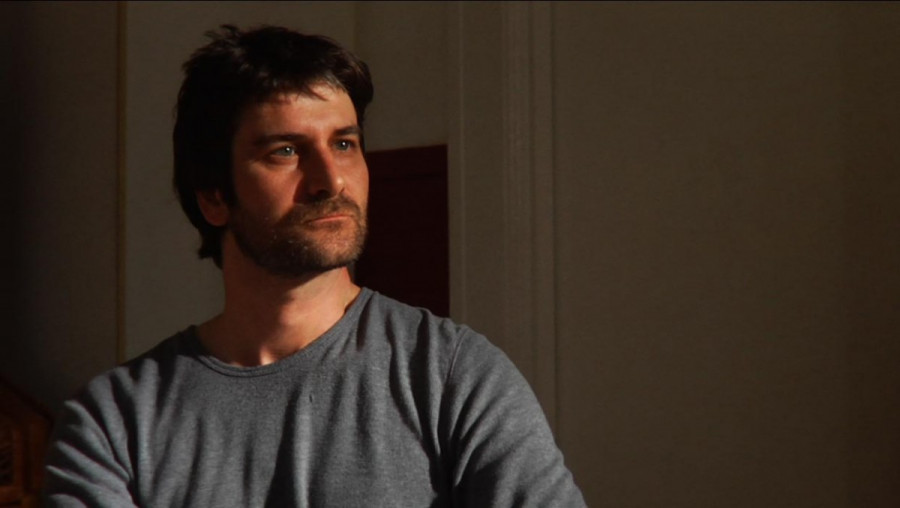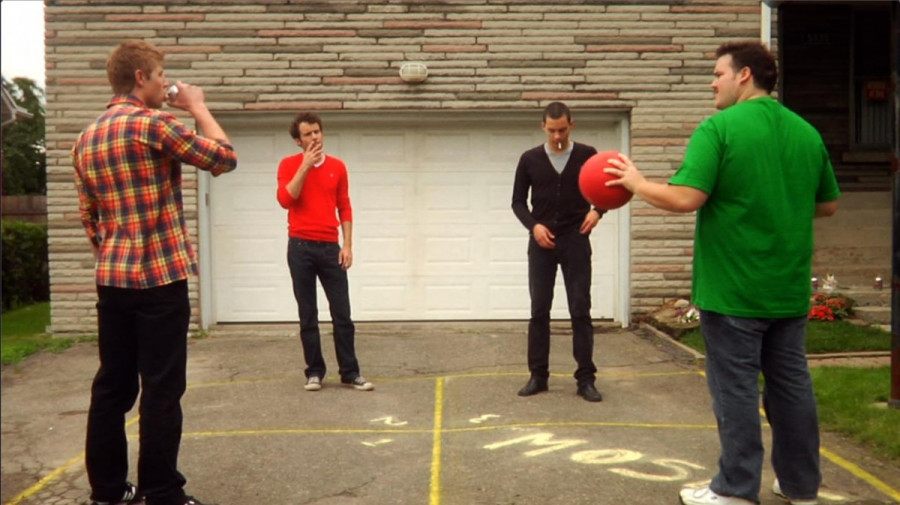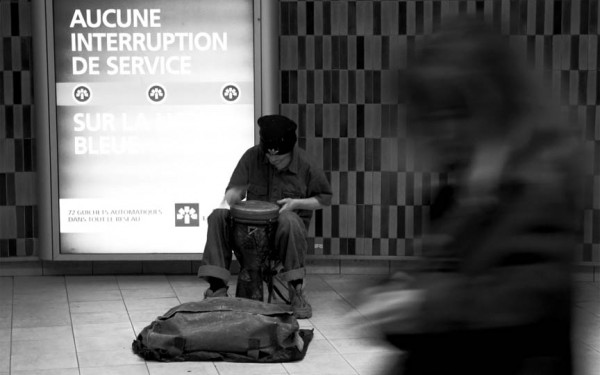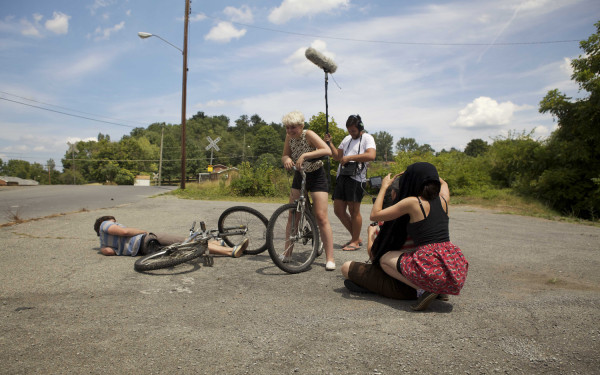From Script to Screening
The Evolution of an Independent Film
It was a homecoming.
Months of writing, planning, casting; days of filming and an eternity editing, with a cast and crew scattered across the globe, all for the ultimate delayed gratification: the world premiere of an independent film.
They gather at the Rendez-vous du cinéma québécois, a motley assortment of artists preparing to unveil the product of three years of work. Shadowboxing’s predominantly Concordia-based cast and crew hover near the entrance, chatting with acquaintances and audience members, waiting for the curtain to drop.
The festival-goers are eventually allowed in. The transition from the cold, contemporary design of the Cinémathèque québécoise’s hall to the dark confines of the screening room sets the mood.
The interior is deep and narrow, an appropriate locale for the showing of an independent film. A slight incline offers a negligible advantage to those who have to sit in the back. The room is packed, the film is sold-out—the backbreaking work has paid off.
All five producers are present, as is the director, production designer and the film’s main cast. Friends, family members and film aficionados gather.
The Show Begins
“I can’t think of a better way to premiere the film, because the actors got to be there, the crew got to be there, so in that sense I think it’s the best thing that could have happened,” said Jesse Klein, writer and director of Shadowboxing. “I’m thrilled to have it premiere here.”
The premiere was most appropriately located, due to the film having been shot in Notre-Dame-de-Grâce, and most of the crew hailing from Montreal.
“Home hype is more special than any other kind of publicity,” said Durga Chew-Bose, Klein’s writing assistant and one of the film’s producers.
“Local newspapers, alumni newspapers; it’s so much more special and I think there’s a level of sincerity and compassion that a hometown crowd can give that none other can,” she said.
Her involvement with the project has been nearly as long as Klein’s: the pair began writing the script while studying in England in 2007.
“I started off as Jesse’s writing consultant when he first started writing the script and then it was one of those things where you end up taking on so many different jobs within a film, because that’s kind of how it works, so I became a producer,” she explained.
The film, about the dynamics of a dysfunctional family collectively battling their own existential crises and the implications of returning home to even more dysfunction and problems than what was left behind, prompted questions about how autobiographical the film was for its writer.
Klein viewed the film as the culmination of ideas, stray thoughts, and loose ends. The writing took place over an eighteen-month period, during which he wrote and re-wrote the script.
“Generally for first films, it’s kind of like everything you’ve thought about in various different ways seeps into your first work, so there wasn’t a specific event, and certainly not a personal specific event that inspired it,” said Klein. “It’s more that when I sat down and started writing it, it ended up being Shadowboxing.”
Once the script was complete, Klein began looking for producers. That is how he met Marley Sniatowsky, who got involved with the project in winter of 2009.
“When I walked into the JavaU on Monkland, Jesse did a double take, and almost walked out because he was expecting—I don’t know why, maybe it was the way I write—he was expecting a 30 year-old woman named Marley, and he got a 17-year-old kid,” said Sniatowsky, of his first encounter with Klein.
“I convinced him that I was ready for it, even though I totally wasn’t, and basically that evening we decided to make his film, even though neither of us had ever made anything close to a feature, nothing longer than five minutes.”
Films and Funds
Lack of background and experience in filmmaking made fundraising difficult, explained Sniatowsky. The film was ultimately funded by friends, family and a few outsiders.
“Almost everyone was unpaid and volunteered, and they were amazing. They did it because they believe in the project,” he explained.
Along with hiring a total of five producers, as well as people for production, costume, design, music and direction, Klein consulted with a casting agency to find the perfect cast. While the majority of the principal cast members were professionals, budget limitations made it essential for those involved with the film to cast friends and family members, as well as themselves, as extras in the film.
Filming took place in June of 2009, over sixteen non-consecutive days. With budget restrictions and volunteer crew members, filming was a one-shot deal.
As far as the film’s talent goes, just because your face is on the poster, doesn’t mean you did a significant portion of the work. Shadowboxing’s own lead actor, Robert Lamont, who played the film’s conflicted and wavering protagonist, admitted that his role in the film was minimal, despite the fact that he logged
the most amount of time on celluloid.
Lamont plays Sam Eliot, the likeable and relatable character whose arrested development leads him to go home in search of answers, but finding only that his family members are as conflicted by life as he is.
Lamont was cast only days before production was slated to begin and filmed alongside the rest of the cast for three weeks. After that, it was up to Klein and his team of producers to work on putting the film together for an additional year and a half.
Lamont said, “I came in probably halfway through, and I got to take advantage of all the work they’d done for such a long time. And I even got paid and I got to go to this fully catered set, and then I got to leave and I didn’t have to worry about putting it all together. It’s always easy to get the leading guy credit, but doing this project made me realize how unfair that is.
“All I really had to do was show up, take Jesse’s direction and memorize the words,” Lamont said. “When I say I don’t deserve the credit it’s really true. It was really a three week period that I was involved in the thing at all. There are five producers that did it all.”
Phillip Xavier Matz plays the unconventional patriarch of the Eliot family. Struggling with alcoholism, his father’s death and unfulfilled expectations for himself, life takes its toll on Eliot, both physically, notable through his haggard and tired appearance, and psychologically, evident through his erratic behavior and loss of hope in life.
Like Lamont, Matz admitted that in an independent film, the role of the actors is minimal when compared to the amount of work the film’s crew logs. Matz auditioned for the role two years prior to the Feb. 24 premiere, shot his scenes over the span of three weeks and was otherwise uninvolved with the film since then, until its premiere in the Rendez-vous du cinéma quebecois.
Reel-ality
Unlike the actors, Klein’s prolonged involvement with the film taught him a few lessons. The director admitted that the crew had to learn to adjust to certain constraints: time limitations and actors’ schedules, for instance.
“You make a lot of concessions as an independent film maker,” said Klein.
A three-year process of writing, editing, producing, filming (and editing some more) all culminated in one night with the film’s premiere in a prominent Quebec film festival.
What was merely a job for the film’s actors and an outing for the film’s audience-members, was a labour of love for the devoted few, namely Klein and his team of producers, who saw the project through from inception to fruition. What was three years earlier only a few words written by a former Concordia student became a source of inspiration, obsession and devotion for those who subsequently became involved with it.
But where to go after a long production process concludes with the film’s premiere?
“More festivals, I hope,” said Alexandra Bégin, Shadowboxing’s production designer. “This premiere is just the kick-off point. If people see it and people talk about it then other festivals will know us now; hopefully then they’ll pick us up. It’s just getting the word out there in the biggest way possible right now.”
For most people, the cinematic process begins with a bought ticket and ends with credits rolling and lights flashing on. Ten dollars at the ticket booth and a few dollars for popcorn and gummi bears are the only price a non-committal theatre-goer has to pay for two hours of entertainment.When you’re an independent filmmaker, the cinematic process is considerably different. Getting a film made means getting funding from your dwindling savings account (and sometimes from your mom), casting whoever is willing to act in the film for as little money as possible, and begging everyone you and your friends know to come watch your film (and to tell their friends about it).
Such is the life of an independent filmmaker, and such is the life of Jesse Klein and all those involved with Shadowboxing.




web__600_375_90_s_c1.jpg)


_600_375_90_s_c1.jpg)